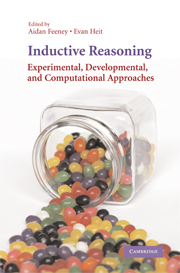Book contents
- Frontmatter
- Contents
- List of Figures
- List of Tables
- List of Contributors
- Preface
- 1 What Is Induction and Why Study It?
- 2 The Development of Inductive Reasoning
- 3 Interpreting Asymmetries of Projection in Children's Inductive Reasoning
- 4 Property Generalization as Causal Reasoning
- 5 Availability in Category-Based Induction
- 6 From Similarity to Chance
- 7 Theory-Based Bayesian Models of Inductive Reasoning
- 8 Use of Single or Multiple Categories in Category-Based Induction
- 9 Abductive Inference: From Philosophical Analysis to Neural Mechanisms
- 10 Mathematical Induction and Induction in Mathematics
- 11 Induction, Deduction, and Argument Strength in Human Reasoning and Argumentation
- 12 Individual Differences, Dual Processes, and Induction
- 13 Taxonomizing Induction
- Index
7 - Theory-Based Bayesian Models of Inductive Reasoning
Published online by Cambridge University Press: 26 February 2010
- Frontmatter
- Contents
- List of Figures
- List of Tables
- List of Contributors
- Preface
- 1 What Is Induction and Why Study It?
- 2 The Development of Inductive Reasoning
- 3 Interpreting Asymmetries of Projection in Children's Inductive Reasoning
- 4 Property Generalization as Causal Reasoning
- 5 Availability in Category-Based Induction
- 6 From Similarity to Chance
- 7 Theory-Based Bayesian Models of Inductive Reasoning
- 8 Use of Single or Multiple Categories in Category-Based Induction
- 9 Abductive Inference: From Philosophical Analysis to Neural Mechanisms
- 10 Mathematical Induction and Induction in Mathematics
- 11 Induction, Deduction, and Argument Strength in Human Reasoning and Argumentation
- 12 Individual Differences, Dual Processes, and Induction
- 13 Taxonomizing Induction
- Index
Summary
INTRODUCTION
Philosophers since Hume have struggled with the logical problem of induction, but children solve an even more difficult task – the practical problem of induction. Children somehow manage to learn concepts, categories, and word meanings, and all on the basis of a set of examples that seems hopelessly inadequate. The practical problem of induction does not disappear with adolescence: adults face it every day whenever they make any attempt to predict an uncertain outcome. Inductive inference is a fundamental part of everyday life, and for cognitive scientists, a fundamental phenomenon of human learning and reasoning in need of computational explanation.
There are at least two important kinds of questions that we can ask about human inductive capacities. First, what is the knowledge on which a given instance of induction is based? Second, how does that knowledge support generalization beyond the specific data observed: how do we judge the strength of an inductive argument from a given set of premises to new cases, or infer which new entities fall under a concept given a set of examples? We provide a computational approach to answering these questions. Experimental psychologists have studied both the process of induction and the nature of prior knowledge representations in depth, but previous computational models of induction have tended to emphasize process to the exclusion of knowledge representation. The approach we describe here attempts to redress this imbalance by showing how domain-specific prior knowledge can be formalized as a crucial ingredient in a domain-general framework for rational statistical inference.
- Type
- Chapter
- Information
- Inductive ReasoningExperimental, Developmental, and Computational Approaches, pp. 167 - 204Publisher: Cambridge University PressPrint publication year: 2007
- 8
- Cited by



